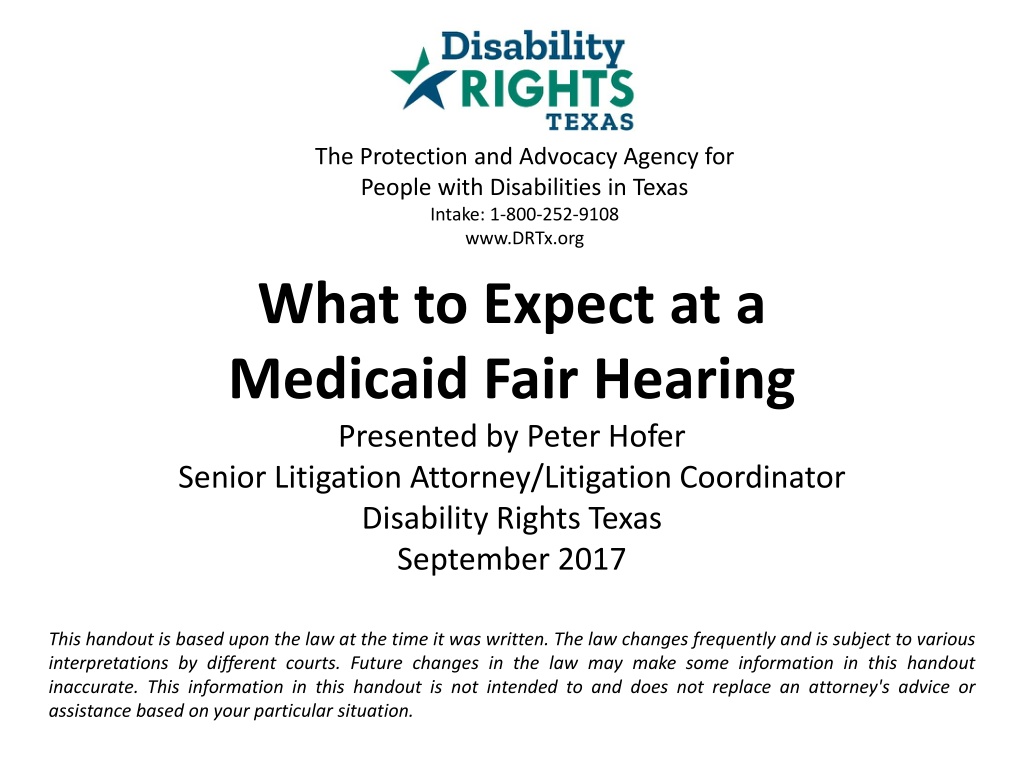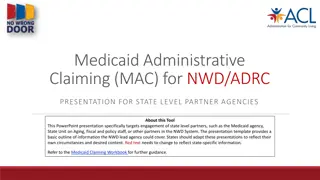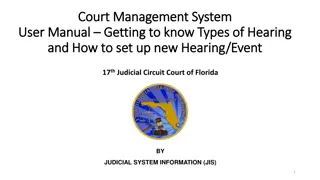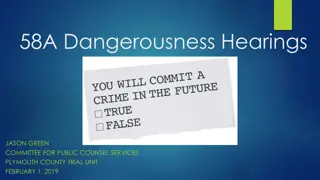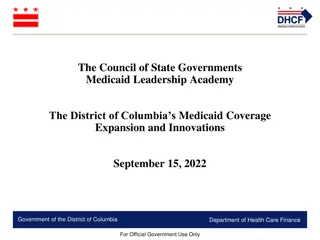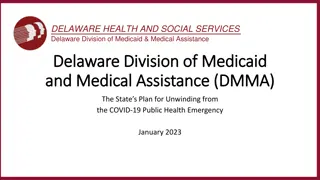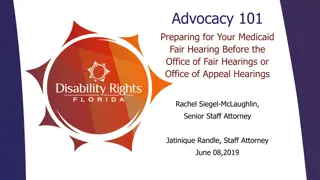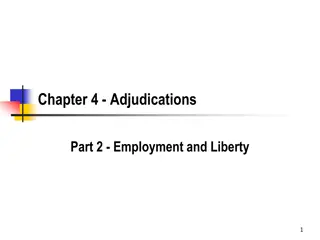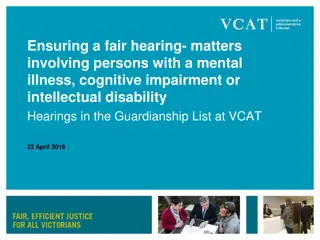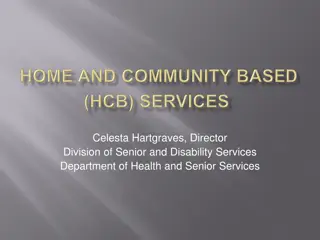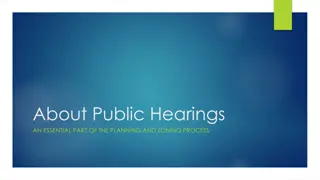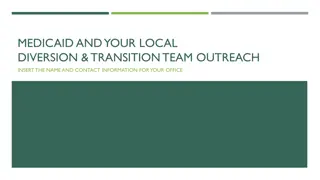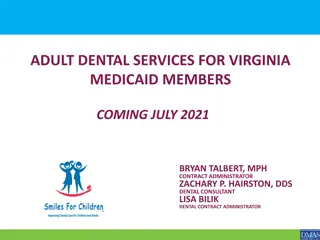Understanding Medicaid Fair Hearings in Texas
Learn about what to expect at a Medicaid Fair Hearing in Texas, including your rights as a beneficiary, the basics of the hearing process, and what you should have with you. You'll get insights on the rules, the hearing procedure, and the importance of testimony, as well as tips on how to navigate the hearing effectively. The information provided, based on a presentation by Disability Rights Texas, gives a comprehensive overview of the Medicaid Fair Hearing process as of September 2017.
Download Presentation

Please find below an Image/Link to download the presentation.
The content on the website is provided AS IS for your information and personal use only. It may not be sold, licensed, or shared on other websites without obtaining consent from the author. Download presentation by click this link. If you encounter any issues during the download, it is possible that the publisher has removed the file from their server.
E N D
Presentation Transcript
The Protection and Advocacy Agency for People with Disabilities in Texas Intake: 1-800-252-9108 www.DRTx.org What to Expect at a Medicaid Fair Hearing Presented by Peter Hofer Senior Litigation Attorney/Litigation Coordinator Disability Rights Texas September 2017 This handout is based upon the law at the time it was written. The law changes frequently and is subject to various interpretations by different courts. Future changes in the law may make some information in this handout inaccurate. This information in this handout is not intended to and does not replace an attorney's advice or assistance based on your particular situation.
THE RULES the basics All hearings must be held at a reasonable time, date, or place The beneficiary has the right to Bring witnesses Establish all pertinent facts Present an argument without undue interference Question or refute any testimony or evidence, and confront and cross examine adverse witnesses Submit documentary evidence before, during, or after the hearing
THE HEARING the basics The hearings are : Informal Typically conducted by phone The hearings officer is not a lawyer or a medical professional. The rules of evidence and procedure do not apply The agency/MCO bears the burden of proof (and therefore presents its evidence first) The agency s/MCO s attorney may appear
THE HEARING What to have with you: Your exhibits and the agency s/MCO s exhibits (the fair hearing packet) Proof that you submitted your evidence (e.g., fax confirmation, email) The fair hearing notice An outline for your testimony Paper for taking notes Calendar in case the hearing is rescheduled
THE HEARING the beginning The hearings officer starts the hearing with introductions an overview of the hearing process a statement that ruling will be based on policy a review of the evidence/exhibits that have been submitted and swearing in of witnesses If you need to have a witness taken out of order or at a certain time, ask at the beginning of the hearing. If you have not received the evidence/exhibits that have been submit, notify the hearings officer at the beginning of the hearing.
Testimony The agency/MCO goes first, as it has the burden of proving that its decision was correct. Pay attention to the individual proving testimony. Check the evidence packet to see their involvement in the decision. Were they the reviewing medical director who made the decision? Was it the nurse who provided the assessment? Be prepared for an endless review of possibly irrelevant policies Listen for new reasons for denial or reduction Listen for factual errors Listen for the policy or legal basis for the denial Take notes (one side notes, one side possible questions)
IN THE HEARING If you want to question or cross examine the agency/MCO representatives Ask leading questions whenever possible i.e. state a fact, then follow the fact with correct? or isn t that right? Ask the witness what their role was in the decision Lay out proper policy, standard, rule Go over deficiencies in notice Pin down reason for the decision Attack reason for the decision Point out factual errors Use letters of medical necessity Any information you reference should have been introduced as evidence at the beginning of fair hearing.
IN THE HEARING Direct exam of your witnesses After your witnesses testify, the agency and the hearings officer may ask them a few questions. Your witnesses should: be polite be honest be committed know who the real audience is (the hearings officer) answer (only) the question asked not be afraid to say, I don t know if they don t know the answer (no speculation or guessing (preparation is key)) Redirect your witness
IN THE HEARING Closing argument Simple summation of factual and legal points Should be outlined before hearing Add any helpful points that came out in the hearing Refer to your notes
AFTER THE HEARING BUT BEFORE THE DECISION If you want or need to submit additional evidence, ask that the record be kept open
IN THE HEARING Read the hearings officer Know when to stop Remember the hearing officer is your audience, you are no longer trying to convince the agency/MCO their decision was erroneous.
THE HEARING DECISION timelines The hearing decision will not happen at the hearing. Continued services must be authorized until the decision issues. The decision must be issued within 90 days from the date the appeal request is received (may be extended by as many days as the hearing is postponed or recessed at the request of the appellant).
THE HEARING DECISION The Hearing Decision Must be written, and will be mailed to you Win or lose, a new request for services must be submitted if the service is a recurring, prior authorized service The resubmission should set out current conditions and needs
POST-HEARING remedies if you lose the fair hearing Options if you lose at the fair hearing: Resubmit (because of change in conditions or needs or with better documentation) Request that the hearing be reopened (within one year of decision; must show that there is new evidence that was not offered at hearing, that the new evidence would have affected the outcome, and that the decision is therefore invalid) Request for an amended and reissued decision (within 20 days after decision is issued) Request an administrative review of the decision (postmarked no later than 30th day after the date of the decision)(prerequisite for seeking judicial review) File for judicial review in the district court in Travis County not later than the 30th day after the date of the notice of final decision
The Protection and Advocacy Agency for People with Disabilities in Texas Intake: 1-800-252-9108 www.DRTx.org This handout is based upon the law at the time it was written. The law changes frequently and is subject to various interpretations by different courts. Future changes in the law may make some information in this handout inaccurate. This information in this handout is not intended to and does not replace an attorney's advice or assistance based on your particular situation.
